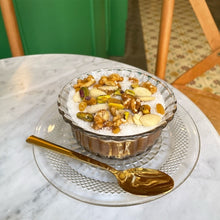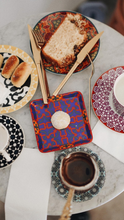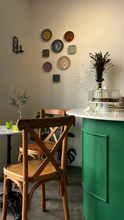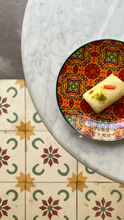‘El ezz lal rizz wel berghol shanak halo,’* laughs Joseph Sayegh when telling us about the ingredients of meghle and why the dessert is considered a symbol of wealth. We sat down with the entrepreneur behind Levant, the new gourmet spot in Beirut, to uncover the secrets of our local desserts and what they reveal about our society and traditions.
Two ladies walk inside the pastry shop, they want to try the Karabij. Joseph explains, ‘the cream natef is what used to be called karabij, it is vegan, made with the roots of a plant saponaria ‘shirsh el halawe,’ whipped into a foamy cream (kerbaj means a whip). Back in the days, he tells us, when our parents were kids, there was a game, if you got two dices with the same number you won your karabij (cream) for free. It came in a cornet, like ice cream. Now what we call karabij is the cookie, ‘it’s like maamoul bi festok (pistachio filled cookie).’ Joseph suggests a drink, mate, 2ahwe bayda (white coffee) or zhourat, an infusion with his mix of flowers and plants from the mountains. The herbs come from Hayata, his village in the North, where women harvest them, then prepare the mix ‘sale2’ (boiling). Zaatar (thyme), sage, akkoub, khatimmiye, 2ers el 3anne… each herb has its health benefits and the elderly women in the village know the properties of each plant. We eye the brownies, they are also vegan, made with dark chocolate and tahini, no lactose, no sugar. On the menu, Levant proposes traditional classics; halawet el jeben, znoud el sitt, mhallabiye, namoura… ‘Things that surprisingly are not that easily available in Beirut,’ you would have to go to a Lebanese restaurant, have your whole meal, then get to the dessert part. Joseph’s mother prepares the sfouf herself, homemade with debs concocted by a woman from his village, and her friend makes the maamoul 3asal (honey). On the pop-colored counter, you will also find playful dessert twists which rotate with the seasons, the ingredients, and new finds… The entrepreneur remembers he was inspired when he tasted a chocolate mousse with zaatar in Paris. He puts a spin on the San Sebastian cheesecake made with mawared (rose water) or the chocolate halawe (halva) tart. Each dessert comes with a little guide to tell you what to expect when discovering these delicacies for the first time; halawet jeben ‘like a mochi meeting a cheesecake’, or meghle: a silky pudding made with rice powder loaded with caraway, anis, shredded coconut, pistachio, almonds..., a symbol of wealth, usually prepared when a child is born. Knefeh, Kol wou shkor (Baklava), mafrouke, Joseph is enthusiastic about the limitless products to explore but wants to keep the friendly, relaxed vibe of this small cozy space.
The entrepreneur left Lebanon in 2012 to study Computer Engineering in France, a field he is now working in. He’s been abroad for 10 years but always kept a side project in his country. He was involved with the NGO WLCU (World Lebanon Cultural Union) which organizes trips for the diaspora to Lebanon, and also cofounded Kulluna box, a gift box supporting Lebanese businesses. He launched an initiative for hiking trails in his village, and brings along his friends who often come visit Lebanon from abroad. Last year, a group of his friends came to visit from Paris and they asked him to take them to taste local sweets. He realized existing shops in Beirut are designed for us to buy in bulks, you can’t just indulge in one sweet on the spot. The idea crystalized in his mind, he found a location and opened this September. Joseph immersed himself in his venture, read books about sweets, but he tells us ‘I am not a pastry chef, and am not reinventing the wheel, I am just standing on the shoulders of giants.’ Levant is about the curation of items from the best suppliers and home pastry chefs. A dessert restaurant with a Levantine touch, ‘somewhere between a patisserie Parisienne and a salon Beyrouthin,’ each piece is elevated with its own story, its own display, inside this homey social locale. The young man who always loved drawing, takes out a sketch, the original one he drew to design Levant’s space. He tells us he had to update that drawing, moved the couch to the other side, so that we could see the green counter when passing by car on bustling Gemmayze street. He imagined the items now placed here; the rust-colored velvety vintage sofa, the dark wood table, the chandelier with some lights not working just like in a true Beiruti home, the bookshelf upstairs in the mezzanine taken from his grandma’s house, and round tables on the sidewalk like a bistro in Paris, with the rare electricity plug, to disconnect, or work a little, but not too much. Joseph also envisions Levant as a landing spot for tourists and expats to plan their trip from, maybe someday discover it in Paris or London, project themselves in our fun, homey, flavourful Beirut, and plan their next trip here.
![]()
Maamoul: a butter cookie filled inside, the filling can be dried dates, nuts or other flavours.
Akkoub, khatimiyye and 2ers el 3anne are edible wild plants used for herbal teas.
Halawet el jeben: a dessert made with thin semolina, cheese and sugar dough, filled with cream
Znoud el sitt: a golden brown crispy dessert dipped in sugar syrup and filled with cream.
Mhallabiye: a sweet milk pudding
Namoura: a dessert with a cake like texture made with semolina flour, topped with syrup
Sfouf: a dessert with a cake like texture made with semolina flour, turmeric, sesame paste, pine nuts and other ingredients.
Debs: molasse
Knefeh: a dessert made with crumbly pastry and cheese, served with sugar syrup.
Mafroukeh: dessert of semolina dough with sugar and pistachio, topped with orange blossom syrup
*’glory to rice and the rope for boulgour,’ in the early 20th century, rice was rare and expensive while boulgour (cracked wheat) was an inexpensive food, this expression is used when encountering a wealthy person enjoying their sensibly earned fortune.








